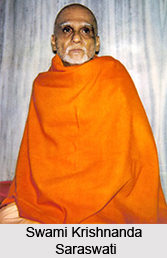 Swami Krishnananda Saraswati was a prolific theologian and philosopher. He served as the President of the Sivananda Literature Research Institute and the Sivananda Literature Dissemination Committee. He was also the editor of the Divine Life Society`s monthly paper, Divine Life, for 20 years.
Swami Krishnananda Saraswati was a prolific theologian and philosopher. He served as the President of the Sivananda Literature Research Institute and the Sivananda Literature Dissemination Committee. He was also the editor of the Divine Life Society`s monthly paper, Divine Life, for 20 years.
Swami Krishnananda was born on April 25, 1922, into an orthodox Brahmin family. Initially he was known as Subbaraya. He did his high school education from Puttur, Karnataka. He studied ancient texts like Bhagavad Gita, Upanishads and Vedas and so on. He believed in Advaita Vedanta philosophy, though he belonged to the traditional Madhva-sect. Subbaraya took up Government service in the Bellary District in 1943 but did not work for long. He left for Sivananda Ashram.
Swami Sivananda initiated Subbaraya into Sannyasa on the day of Makar Sankranti, January 14, 1946, and he was named Swami Krishnananda. He was engaged in letter writing, writing messages and even assistance in compiling and editing books. He was also assigned the work of typing up the hand-written manuscripts of Sivananda. In 1948 he was asked to do more work which included writing books on philosophy and religion. He conducted classes and lectures as per instructions of Swami Sivananda.
Swami Krishnananda was asked to collaborate with the Working Committee of Divine Life Society. He received a position of secretary concerned with finance. Thereafter he was nominated as the General Secretary of the Divine Life Society.
As he possessed good literary skills and understood the entire range of works of Sivananda he was appointed President of the Sivananda Literature Research Institute. He also served as the President of the Sivananda Literature Dissemination Committee, which was formed to bring out translations of Sivananda`s works in main Indian languages. He was also the editor of the Divine Life Society`s monthly publication, Divine Life for twenty years.
He was also a master of every system of Indian thought and Western philosophy. In most of his texts he has brought together Eastern and Western philosophies with surprising efficiently. He has also conducted comparative studies of the Vedanta and most of the prominent Western philosophers. He breathed his last on November 23rd 2001.









